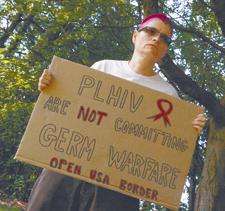An Aug 16 rally in support of lifting all travel restrictions on HIV positive visitors to the United States took place at the Peace Arch at the Canada-US border.
Canadian Martin Rooney, who was denied entry into the United States in 2007 because he is HIV positive, organized the event.
“Please Mr Obama lift this ban now,” said Rooney to approximately 30 attendees. “There is no medical science to support that HIV is a contagious disease that presents a threat to public health or national security of the United States.” He said the immediate publication of new regulations removing remaining travel restrictions would be “an enormous step forward” in treating HIV positive people with the dignity they deserve.”
Former US president George W Bush lifted an outright ban in 2008, but HIV positive visitors are still required to submit a waiver before entering the United States.
On World AIDS Day 2006, Bush instructed the secretary of homeland security to “initiate a rulemaking that would propose a categorical waiver for HIV-positive people seeking to enter the United States on short-term visas.”
At the time, AIDS activists were cautiously optimistic but wary about what shape the new rules would take.
The US has barred HIV-positive travellers and potential immigrants from entering the country since 1987. Congress codified this policy in 1993, as part of the Immigration and Nationality Act (INA), meaning it would take an act of Congress to reverse the ban completely.
Under the new rules, waiver applicants would have to agree to give up the ability to apply for a change in status while in the US, including applying for legal permanent residence.
Applicants would also have to travel with all of their HIV meds needed during the trip, prove they have medical insurance accepted in the US, and prove they won’t engage in behaviour that might put the American public at risk.
David Parsons, who enjoys travelling to Seattle to watch professional sports, spoke about his experience with the new waivers.
“Once you figure out the process, it takes maybe five days to get [the waiver],” he said. “It’s pretty easy and it costs $135. It’s not the best but it’s an improvement. You just go to an American consulate website and click on visa and you just follow the instructions from there.”
But Rooney opposes the waiver on principle.
“If I have a contagious disease of significant public threat to the United States and its people then $135 US doesn’t make me any less of a threat,” he said. “So on those grounds alone I will not apply for the United States waiver.”
The restrictions, according to many rally attendees, serve as a reminder of the stigma faced by people living with HIV and AIDS. Sonia Marino, who works for an AIDS service organization, says she knows many people who face discrimination at the border due to their perceived HIV status.
“I think some people put their lives at risks,” she said. “Some people will interrupt their drug treatments because they don’t want to be caught taking HIV meds across the border. They don’t want to be vilified or criminalized at the border.”
AIDS activist Bradford McIntyre refuses to cross the border for that reason.
“I’ve been HIV positive for 25 years, and have actually not visited the United States since 1997 when I started antiretroviral drugs because I refuse to lie at the border and hide my meds and risk my health,” he said. “So unfortunately I haven’t been able to visit a country that for most of my life I’ve enjoyed and loved to visit because of this matter,”
Vancouver Centre Liberal MP Dr Hedy Fry, who also spoke at Rooney’s previous rally in 2008, said there is no medical justification for the ban as HIV is not a contagious disease.
“It doesn’t make any public health sense, and so really what it was, was a prejudicial decision that was unfair and that was based on ideology more than anything else,” she argued.
The travel ban has affected at least one queer organization in Surrey from fulfilling its mandate. The Imperial Sovereign Court of Surrey requires that an applicant for Emperor or Empress be able to cross international borders in order to attend at least two American coronations.
“That very requirement could preclude people from running for emperor or empress if they were HIV positive,” said Empress 5 Elektra Quecha who attended the rally alongside Emperor 5 Wolfgang Bang! “It has affected Emperor I Martin Storm, who is Martin Rooney, because he is unable to cross the border and go to different functions for the International Court society.
Chief executive officer of Housing Works NYC, Charles King, said the ban adversely affects people regardless of nationality.
“The travel ban is much more than just an inconvenience and humiliation for Canadians seeking to visit the United States,” he noted. “It’s also a ban on residency, as such it has a profound impact on persons in the United States living with HIV who seek political asylum, or undocumented immigrants who would obtain legal residence, or a legal resident who would like to be a citizen,” he contended.
“It separates families and keeps people out of treatment and care, even within the United States.”

 Why you can trust Xtra
Why you can trust Xtra


